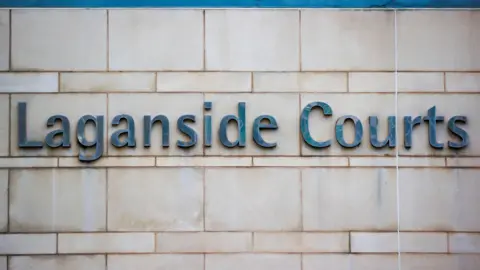Ex-RUC officer sexually abused teenage boy in 80s
 PA Images
PA ImagesA jury at Belfast Crown Court has determined that a former police officer committed the acts of sexually abusing a teenage boy in the 1980s.
Albert Burns - a former CID officer in the RUC - was excused from attending the hearing at Belfast Crown Court following an assessment that his dementia rendered him incapable of attending or understanding the trial process.
It was therefore a short trial, "to determine the facts".
The pensioner, from Carnmoney Road in Newtownabbey, was charged with, and denied, all seven offences which were committed over dates between 3 January, 1987 and 4 January, 1989.
After deliberating for less than an hour, the jury unanimously concluded that 91-year-old Burns "did the acts" alleged by the prosecution, on seven counts of indecent assault.
Burns told him he would not be believed
His victim was aged between 13 and 15 when he was sexually abused by Burns.
The jury heard that Burns targeted the teenager over a two-year period.
The abuse occurred in the bedroom and bathroom of the victim's County Antrim home.
At the time, he did not disclose what was happening to him as Burns told him he would not be believed.
He reported the matter to the PSNI in 2019.
PSNI interview in 2020
During an interview with police, the victim spoke of what he endured in his teens and said that as a child he was afraid of his abuser.
As a result of the complainant's allegations, Burns was interviewed by the PSNI in July 2020 when he denied the claims which he branded as a "bundle of lies," and "made-up".
Before the jury was sent out to deliberate, the defence barrister pointed out that his client had a clear criminal record and was a "man of good character."
He added that there were "no witnesses" and "no forensic evidence" and urged them to exercise "some caution."
Rejecting Burns claims of innocence, the jury returned verdicts that he "did the act" on all seven counts of historic sexual abuse.
The case has been re-listed for 5 March.
What is a trial of the facts?
If, based on medical evidence, a court determines that a person is unfit to stand trial, then criminal proceedings cannot proceed.
Prosecutors, however, have the option to have the matter heard as a "trial of the facts".
This process takes the place of a criminal trial. It is a public hearing to determine whether an accused committed the acts alleged.
It cannot result in a conviction, but if the court is not satisfied that the accused committed the acts alleged, then he/she will be acquitted.
The procedure is allowed for in legislation by Article 49A of the Mental Health (Northern Ireland) Order 1986.
